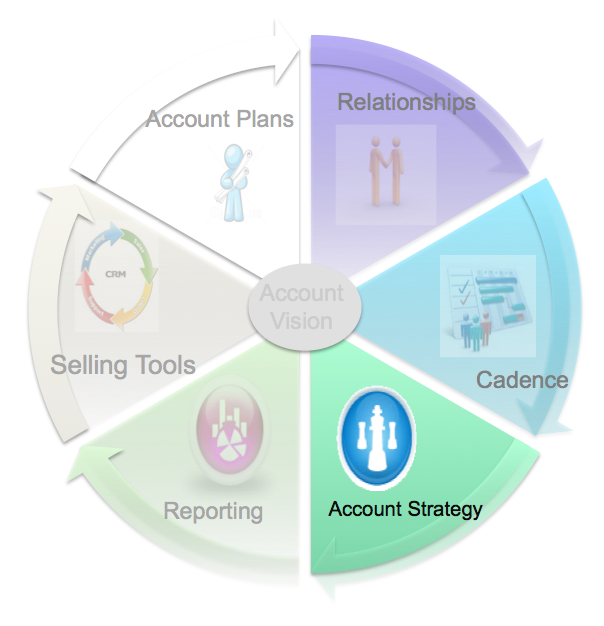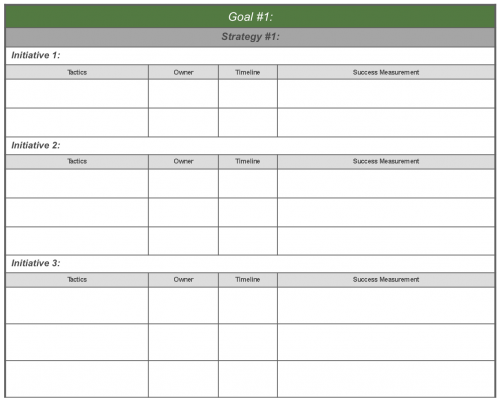Sales Account Strategy: Aligning Your Goals with Your Customer’s Needs
The Importance of Strategies in Account Management
Strategy and account management provide a clear window in the process of goal achievement. As discussed in our earlier post, a well-constructed sales account strategy plan includes a detailed goal section. Goals outline the specific objectives to be accomplished within the account. The key to successful goal attainment lies in the development and implementation of effective strategies. Strategies represent the approach taken to turn those goals into a reality. Leveraging the insights gained through comprehensive analysis of the account and market conditions allows for strategies to maximize results.

Crafting Tailored Strategies for Individual Accounts
The best account management strategies must be tailored to the unique characteristics of each individual account. This requires, first, a thorough analysis phase. Analyze all the relevant factors and gain a deep understanding of the following:
What is happing within the account?
Where is the account heading?
Who are the key influencers to the account?
How is the market evolving?
How is the competition evolving?
Answering these 5 questions for each account is essential to crafting a sales account strategy that is customized to the needs and opportunities of the account. The best account management strategies are built upon a foundation of detailed analysis.
I’ve found, based on the account assessment, there is almost always more than one strategy. Most good account governance plans have multiple strategies for each of their goals. Another way to look at it is if you have 4 goals, you would probably have at least 8 strategies, 2 for each goal. In some cases you may have 3 strategies for each goal. This is the template I’ve used with my teams, again feel free to use it. This would be one strategy for one goal. You would use an additional one for a different strategy for the same goal.
DOWNLOAD THE ACCOUNT STRATEGY TOOL
Strategies are the cornerstone of any successful endeavor. They act as the roadmap to success, helping us to navigate the uncertain waters that stand between us and our goals. However, the strength of a strategy is only as good as the quality of the information that it is based on. Imagine trying to create a strategy to capture Osama Bin Laden with out knowing what he looks like, where Pakistan and Afghanistan are, who the leaders of those governments are, what the geography is, etc. Strategies are only as good as the information that made them. A good sales account strategy needs a good account assessment.
The Role of Account Assessment in Strategy Development
Assessing an account is undoubtedly one of the greatest challenges in sales. Typically, salespeople are not trained to conduct thorough account assessment before diving into a deal, they are skilled at reacting quickly and tactically to opportunities and challenges. Reactivity may win some battles, but they often do little to help sales professionals truly manage their accounts. These reactive approaches often results in unprofitable pricing wars and time-consuming RFP responses. This being said, the assessment section of the account plan is absolutely critical to creating good account strategies.
Implementing Strategies: From Initiatives to Tactics
To be successful, strategies need execution. A clear plan outlining the initiatives and tactics will need to be implemented. For instance, if a goal is to boost revenue by 10%, a strategy may involve introducing a new product to the account. However, to sell this product, a set of initiatives must first be identified. These initiatives bring purpose to the overall sales account strategy by providing a clear path forward. One such initiative for our example could be to demonstrate the value of the new product by aligning it with the customer’s goal of increasing their customer’s satisfaction.
Once the initiatives have been identified, the details of the plan must be ironed out. These details are the specific tactics that will ensure the initiatives are executed successfully. Continuing with the same example, a tactic could involve collaborating with product marketing to determine the specific impact of the new product on the account’s customer satisfaction goals, or arranging a meeting with the account VP to understand how they measure customer satisfaction. The tactics are very specific steps that will be taken to drive the initiatives, that support the strategies, that get you to your goals.
The Link between Account Strategies and Successful Governance
Account strategies are more than a high-level approach that sits on a bookshelf somewhere. Good account strategies are born out of the account plan. They leverage the well researched account and organizational assessment. They have specific initiatives and tactics to ensure they are achieved.
Successful account governance wins or loses on the ability to execute against a sales account strategy. Keep them linked, be specific and attach them to the Approach section of the account plan and they will be achieved.




0 Comments